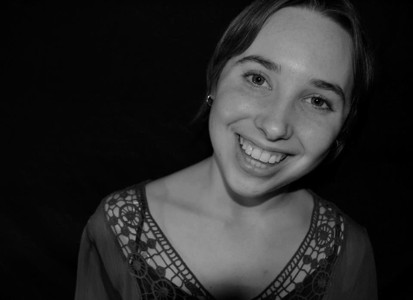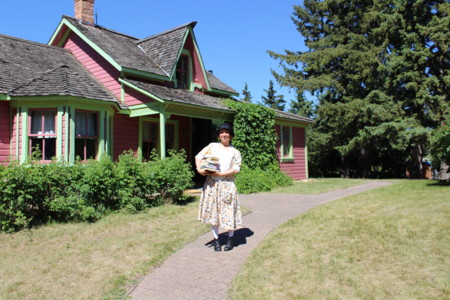4 Questions: Molly Thomas
This week we’re joined by Molly Thomas, who graduated from York 2 years ago, having specialized in Devised Theatre and Playwriting/New Play Dramaturgy. She tells us about the impact of her work at York, and how it helps her in day-to-day work as an historical interpreter.
This article is another in our series 50 Years of Disruption, in celebration of the Department of Theatre’s 50th Anniversary. In it, we’ll ask each participant four questions about themselves and their time at York.
1. Who are you?

My name is Molly Thomas. I graduated from York in 2016 with a B.A. in Theatre. I specialized in Dramaturgy and Devised Theatre, and since graduating have worked as a freelance dramaturge, a researcher, and a farm hand. Currently, I am an historical interpreter at a Provincial Historic Site in Alberta.
2. What was your favourite moment during your time in the Theatre Department, and why?
My favourite moment in the theatre department was working as a research assistant for Dr. Marlis Schweitzer on her project, Ambassadors of Empire.
When I first came to York, I didn’t think “academia” was my scene. It seemed remote and exclusive. But Marlis had a different perspective. She showed me that academia could be down to earth, and that many of the hallmarks of a great artist—curiosity, discipline, critical thinking—are also what make a great scholar. That motivated me.
In the two years I worked on Ambassadors of Empire, I had opportunities to attend CATR conferences, stage a reading of a long-lost farce, and write content for our project website. I even developed a knack for deciphering 19th century handwriting. But most of all, what I gained from the experience was the knowledge that I’d contributed to something bigger than myself. And that gave me confidence moving forward.
3. What comment, quotation, statement, or action that a professor—or classmate—offered had the greatest impact on you?
This is perhaps a simple answer but, “Why here? Why now?” Judith Rudakoff used this phrase regularly. On a macro scale, it’s useful for getting to the heart of a project. For figuring out, why is this important? What purpose does it serve? On the micro scale, it can help clarify details. I find I use this phrase in many areas of my life, and though it can be frustrating to answer sometimes, I think it ultimately makes the things I do more meaningful. Plus, it’s easy to remember.
4. Is there a way you incorporate a particular aspect of your theatre training in your current work?
One of the most useful things I learned in my theatre training was how to create entertainment value for audiences. At the historic site where I work, we run guided tours, children’s programs, and other special events for the public. Our aim is to teach Alberta’s history. Not everyone finds that inherently interesting, so I spend a lot of time collaborating with my co-workers to make our programs fun, engaging and relevant—on a budget. Devised Theatre taught me how to do that.

